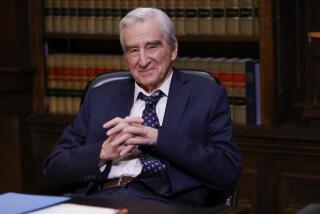On screen, Philip Seymour Hoffman could be anyone
When an actor as extraordinarily gifted as Philip Seymour Hoffman dies as suddenly, as tragically as he did, the mind goes into a kind of shock.
How could a person who could effortlessly be so many people suddenly not be here at all? It doesn’t seem possible.
That shock is even stronger for me because I was at the Sundance Film Festival in Park City, Utah, a little more than a week ago, not only seeing Hoffman on screen in two completely different roles but hearing him talk about his work during a post-screening question-and-answer session.
PHOTOS: Philip Seymour Hoffman | 1967-2014
The characters in these two films could not have been more different. First came Hoffman as Mickey, small-time grifter, part-time criminal and full-time Philadelphian in John Slattery’s “God’s Pocket,” based on the bleak Pete Dexter novel.
The second film was taken from quite another kind of fiction set in a dissimilar world in a far-off country. That would be the Anton Corbijn-directed version of John le Carré’s claustrophobic thriller “A Most Wanted Man,” where Hoffman played, of all people, a gruff German spymaster, complete with appropriate accent, trying to operate in a world where you can’t even think of trusting anyone.
The diversity of these roles was so great that a woman in the audience after the “Most Wanted Man” screening couldn’t help herself. She raised her hand and asked Hoffman the unanswerable question. How can one man play parts that could not have less in common? The actor, not always at ease in public situations, seemed at a bit of a loss.
PHOTOS: Notable deaths of 2014
He talked about studying the characters, about preparation, about having good people to work with. Finally, though he didn’t say it in so many words, the answer became clear: When you are an actor, convincingly becoming the widest possible range of other people is what the job is all about, the essence of the work.
Few, if any, performers of his generation did it better than he did.
Hoffman did not erupt into movie stardom all at once with one big showy role. The first film I really remember noticing him in was Paul Thomas Anderson’s 1997 “Boogie Nights,” half a dozen years past what IMDB says was his debut in something called “Triple Bogey on a Par Five Hole.” His gifts grew on us gradually, just as his performances increased in power and conviction during the course of a given film.
When “A Most Wanted Man” began, I wasn’t sure if this quintessentially American actor could be believable as a lonely German. By the time it ended I wondered how I ever doubted how convincing Hoffman was when he threw himself into his roles. That ability to persuade audiences was even more remarkable when you consider that Hoffman was not an actor given to radically changing his size and shape.
PHOTOS: Hoffman’s memorable roles
He is the same burly, heavyset individual in every role. In theory, someone who looked like him would be the last person you would cast to play the elfin, epicene Truman Capote in Bennett Miller’s 2005 “Capote,” but he not only did brilliant work, he won the lead actor Oscar.
Hoffman’s ability to inhabit his characters completely, almost as an act of will, led to three other Oscar nominations — for his work as a passionate priest in “Doubt,” as a wily CIA agent in “Charlie Wilson’s War” and as a charismatic cult leader in “The Master.” That last was one of five films he made with Anderson, a director whose intense involvement in the filmmaking process seemed to mirror his own.
As fervent about the stage as he was about film, Hoffman had a trio of Tony nominations to go along with his Oscar nods. I was fortunate enough to see the most recent, his work as Willy Loman opposite Andrew Garfield in Mike Nichols’ superb mounting of Arthur Miller’s “Death of a Salesman.”
Loman’s bone-crushing weariness as he comes home from a fruitless trip on the road has been brought to life by some of the greatest of American actors, including Lee J. Cobb, George C. Scott and Brian Dennehy. Hoffman was fully in their league, bringing a lost, disoriented quality to the role that was particularly his own.
PHOTOS: Celebrities react to Hoffman’s death
Thinking back on Hoffman and his work, one of his less showy roles keeps coming into my mind, that of Oakland Athletics Manager Art Howe in Bennett Miller’s “Moneyball.”
On one level, this role does not seem like much of a stretch: as a former sportswriter, I knew that Hoffman’s physical type was exactly right for the part. But having met more coaches and managers back in the day than I wanted to remember, I was even more impressed at how Hoffman had managed to get the part so deeply right, how he’d brought all the barely visible, if not completely invisible, ticks, mannerisms and thought patterns of the real people to the role.
I’ve often felt that the best of actors are the modern-day equivalent of ancient shamans, able to go to mysterious dimensions and come back with meaning and value.
With the death of Philip Seymour Hoffman, we’ve lost a true sage, a seeker of truth in performance. The wisdom and solace he might have brought us, we will never know.
Twitter: @kennethturan
More to Read
Only good movies
Get the Indie Focus newsletter, Mark Olsen's weekly guide to the world of cinema.
You may occasionally receive promotional content from the Los Angeles Times.











